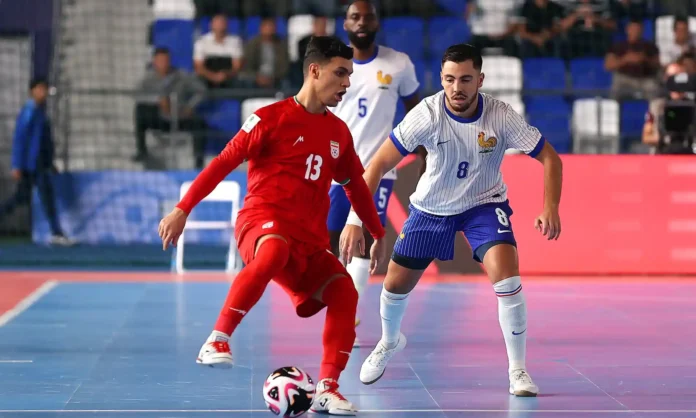
The FIFA Futsal World Cup is embroiled in controversy following accusations of match-fixing after France suffered a surprising 4-1 defeat against Iran.
The outcome of the match has raised eyebrows, leading to complaints from rival coaches who allege that the French performance was orchestrated to manipulate the tournament’s progression.
In a post on X (formerly Twitter), Ricardo Iñiguez, the head coach of Libya, whose team was eliminated from the competition during the group stage, condemned the match as a “disgrace” for futsal.
He announced that Libya would file an official complaint regarding the alleged match-fixing, stating, “It is a disgrace for our sport.” Iñiguez’s remarks sparked a wave of criticism from various figures within the futsal community, intensifying scrutiny on the integrity of the tournament.
The match, held in Uzbekistan, had significant implications for the tournament structure. The defeat opened a potentially easier path for France, as it allowed them to avoid facing the current African futsal champions, Morocco, in the next round.
Instead, the French side would face Thailand, who had already expressed their eagerness to play against the Les Bleus. The stakes were high, with the winner of the match slated to face Brazil in the quarter-finals, a matchup that could heavily impact the tournament’s outcome.
Concerns about the legitimacy of the match surfaced even during its play, particularly in light of the critical context that dictated which teams would progress. Coach Miguel Rodrigo of Thailand expressed his discontent, stating that both France and Iran had committed an act of dishonor against the sport.
“We are waiting to take on the French with open arms,” Rodrigo posted, but he did not shy away from labeling both teams “a world disgrace” for their apparent lack of competitiveness.
Social media scrutiny intensified as video footage circulated, allegedly showing French goalkeeper Thibaut Garros appearing to move away from the ball during the buildup to Iran’s first goal.
Observers pointed out that the French squad managed a mere six shots on goal throughout the match, scoring only a consolation goal after Iran had established a commanding 4-0 lead. These factors have fueled speculation about the intentions behind the French team’s performance.
In response to the unfolding situation, FIFA has announced that it is investigating the claims of “match manipulation” and breaches of “the spirit of the game.”
The organization has stated that it is aware of the complaints lodged by participating teams concerning the Group F match between France and Iran but emphasized that no further comments would be made while the investigation is ongoing.
The reactions from the French Football Federation and the Iranian Football Federation have yet to be disclosed, as both organizations have been approached for comments.
The fallout from this incident could have far-reaching implications for the teams involved and the credibility of the tournament itself.
As the investigation progresses, it remains to be seen how FIFA will handle the allegations and what impact they might have on the future of the teams involved in this controversial match. For now, the Futsal World Cup has shifted from a celebration of sporting excellence to a heated debate over ethics and integrity in the game.
The controversy highlights a growing concern within the world of competitive sports regarding the potential for manipulation and unethical behavior.
With significant financial stakes and national pride on the line, the integrity of international competitions is of utmost importance to fans, players, and governing bodies alike.
As teams prepare for the knockout stages, the specter of this match looms large. The players will not only face the challenge of their opponents on the field but also the scrutiny of a watching world that is increasingly attuned to the ethical implications of their performances.
The ramifications of this controversy may extend beyond the immediate tournament, impacting the reputations of the teams involved and altering perceptions of the Futsal World Cup itself.
Moving forward, it is crucial for FIFA to take decisive action in response to the allegations to restore confidence in the integrity of the tournament.
This incident serves as a stark reminder of the vulnerabilities inherent in competitive sports and the ongoing need for vigilance against corruption and unethical practices.
In conclusion, as the Futsal World Cup continues, all eyes will remain on the unfolding investigation and the potential fallout from this controversial match.
The spirit of fair play, a cornerstone of all sports, is at stake, and the resolution of this situation will be critical in determining the future direction of futsal on the global stage.